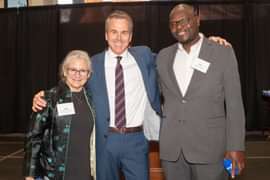August 12, 2016
Generations mourn passing of Jean St. Pierre, beloved educator
Taught English, theatre at Abbot and Phillips academies for 41 yearsby Phillips Academy
Jean St. Pierre, faculty emerita of English and theatre at Phillips Academy, died August 10 at her home in Harwich Port, Mass. She was 79.
When she retired in 2004, St. Pierre had completed 41 years of teaching. She began her career at Abbot Academy in 1963 and continued teaching English for Phillips Academy after the two schools merged in 1973. Twice she served as English department chair, for Abbot Academy from 1971 to 1973 and then for Phillips Academy from 1982 to 1987. (She was the first woman in Phillips Academy’s history to chair the venerable seat in Bulfinch Hall, telling The Phillipian at the time that she was assuming the position with “joy and trepidation.”)
Jean Mary was born August 7, 1937, to Wilfred and Margaret St. Pierre of Lowell, Mass. In a 2004 Andover Bulletin story, she recalled seeing the Abbot campus as a young child on her family’s Sunday drives. “I remember reading the Abbot Gates, the words ‘Enter into understanding that you may go forth to nobler living,’ and I knew this as a place where I would like to be.”
That St. Pierre was a born scholar is evidenced from her 1955 Lowell High School yearbook, in which she had listed all things literary and theatrical for her hobbies and passions. Unlike many of her female counterparts, St. Pierre’s response to the serial question “What next?” was “college.” She earned a BA degree at Wheaton College and continued on to Columbia University, where she earned an MA degree.
St. Pierre was among only a handful of Abbot Academy faculty who were hired to continue teaching at Phillips Academy after the merger. She helped lead the early curricular integration that preceded the merger, spending the summer of 1971 working to develop coed English courses on behalf of the PA-AA Curriculum Committee.
As chair of Abbot’s English department, she helped shepherd the school’s faculty, students and alumni through the turbulence and anger that arose periodically as the two schools worked toward becoming one. Her colleague Tom Regan ’51 would later call her “an angel of mercy, the personification of counseling, consoling and cooperation.”
St. Pierre wrote at the time that “there emerged on Abbot campus a new awareness of what can be created and accomplished when people work together, when people extend trust, when people require strength and resourcefulness of others.” She, along with colleague Mary Minard, led the academic procession, the largest in the school’s history, at Abbot’s final commencement ceremony in 1973.
Remembrances of Jean St. Pierre can be shared below or on our Facebook page.
Although the town of Andover remained her home for four decades, she traveled to Europe often, expanding her knowledge and appreciation for European writers and playwrights. In 1974, with the merger technically complete, she lived for sabbatical year in Rennes, France, teaching English for School Year Abroad. In 1979, St. Pierre studied Romantic literature at Oxford University, building upon research she conducted earlier that year at Dartmouth College while on another sabbatical.
Her studies fomented St. Pierre’s love for theatre, a passion which helped create a renaissance in dramatics at Andover. Despite her primary duties in Bulfinch Hall, St. Pierre helped produce and direct dozens of ambitious student performances, many of them by contemporary British dramatists she had studied abroad, such as Harold Pinter and Alan Ayckbourn.
In 1976, she helped initiate a long-running student exchange program between Andover’s theatre students and student theatre groups from Manchester, England. That year, along with the Theatre department chair, St. Pierre and 10 students traveled to Great Britain, where they gave a series of performances of Gurney’s “Scenes from American Life.”
Although she often could be found in the old George Washington Hall theatre or in the drama lab, St. Pierre’s center of gravity was Bulfinch Hall. Upon being appointed department chair, she lobbied for a renovation of Bulfinch, which she oversaw in 1984. The project included installing stunning oil portraits of past Abbot and Andover scholars, most from the school’s collection, as well as new lighting and paint to enhance the building’s architectural beauty.
In 1984, she led a successful campaign by faculty vote that changed the English department’s curriculum requirements. Unpopular among students and some fellow faculty, the change created a yearlong English requirement for all uppers. (Despite the unpopularity of that decision, St. Pierre’s signature English course, the senior-level “Man and God,” remained among the most coveted—and continued to be so until her retirement.) St. Pierre’s ability to build consensus around tough decisions, already proven in the merger years, gave birth to a number of important architectural and socio-political improvements at Andover.
In 1984, after successfully persuading Head of School Donald McNemar to renovate Bulfinch Hall, she gathered a small group of colleagues to persuade him of the need to renovate the theatre in George Washington Hall. The space had been designed as a lecture hall, lending bad acoustics and site lines to the popular dramatic productions, and an instructor in architecture had deemed the stage structurally unsound. Eventually, their efforts bore fruit, first with the Steinbach Theatre and then with the Tang Theatre. During that period, St. Pierre enthusiastically conducted student productions in the basement of Taylor Hall.
St. Pierre served on the Coeducational Study Committee, formed in 1983 to assess the outcomes of the merger 10 years later. The committee produced the landmark report, A Portrait of a School, Coeducation at Andover, which concluded that much work remained in creating a climate of gender equity. The report also gave rise to discussions about the climate of racial inequity on campus.
In response to the report, St. Pierre teamed with Vincent Avery, then-chair of the philosophy and religious studies department, to lead the Faculty Equity Committee. The group’s charge was twofold: to evaluate the cultural perspectives of the school’s courses to find ways to make them more equitable and to take decisive and aggressive measures to recruit more teachers of color.
St. Pierre urged faculty to help the recruiting effort by visiting schools and introducing Andover to talented teachers of color. Her efforts led to the eventual formation of the Institute for Recruitment of Teachers (IRT) by Kelly Wise and Andover Bread Loaf (ABL) by Lou Bernieri. In the early days of ABL, St. Pierre was a particularly vital partner.
St. Pierre’s last visit to campus was May 7, 2013. She attended the dedication of the newly renovated Bulfinch Hall and, with dozens of former students and colleagues, celebrated the dedication of the St. Pierre Classroom. The granite benches of the outdoor classroom adjacent to Bulfinch ensure that St. Pierre’s crucial contributions to Abbot and Andover will be remembered for decades to come.
St. Pierre is survived by her sister, Mary Baroni; brother-in-law Daniel Baroni; nephews Scott and Christopher Baroni; and numerous godchildren. Memorial donations may be made to the Jean St. Pierre Scholarship Fund, which supports students from New England and, in particular, from her hometown of Lowell, Mass. (Visit www.andover.edu/giving and indicate “Jean St. Pierre Scholarship Fund” under Special Instructions.)
Categories: Academics
Other Stories

Saluting two retiring faculty with a combined total of 46 years of service to Andover




